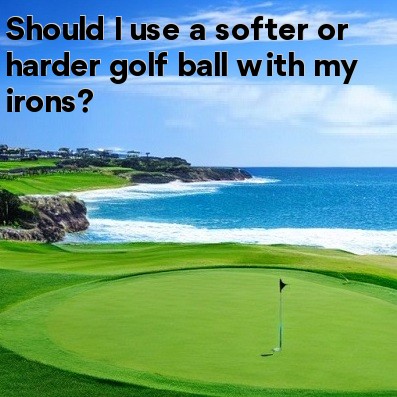
Should I use a softer or harder golf ball with my irons?
One important factor for golfers to consider when choosing the right equipment is the type of golf ball to use. Each golfer has different swing speeds and preferences, and one question that often arises is whether to use a softer or harder golf ball with irons.
Softer Golf Balls:
- Soft golf balls have a lower compression rating, typically ranging from 50 to 80.
- They are designed to compress more upon impact, resulting in more control and spin.
- With irons, softer balls often provide better feel and allow greater shot-shaping capabilities.
- Golfers with slower swing speeds may benefit from using softer balls as they require less force to compress.
- Players who prioritize touch around the greens and desire enhanced short game control may also prefer softer golf balls.
Harder Golf Balls:
- Hard golf balls have a higher compression rating, usually ranging from 90 to 110.
- They are designed to resist compression and offer more distance off the tee.
- Harder balls often produce less spin, which can be beneficial for golfers struggling with slices or hooks.
- Golfers with faster swing speeds may benefit from using harder balls, as these balls can handle the extra force.
- Players looking to maximize distance without sacrificing control may prefer harder golf balls.
Selecting the Right Golf Ball:
Ultimately, the choice between a softer or harder golf ball with irons depends on individual factors and goals. Here are some considerations to help you make an informed decision:
- Skill Level: Beginners and higher handicap golfers may find a softer ball more forgiving, whereas advanced players may benefit from the enhanced control offered by softer balls.
- Swing Speed: If you have a slower swing speed, a softer ball can help you achieve better compression, resulting in more distance. Conversely, if you have a faster swing speed, a harder ball can handle the extra force and potentially increase your distance.
- Shot Type: Consider the types of shots you typically play and the attributes you value most. If you prioritize control, spin, and shot shaping, a softer ball could be a better fit. If distance and minimizing side spin are your priorities, a harder ball may be more suitable.
- Testing: To determine which ball works best for you, it's helpful to test different options on the driving range and course. Pay attention to how the ball feels at impact, the trajectory it produces, and the level of control it provides.
Ultimately, finding the right golf ball for your irons is a personal choice. It may require some experimentation and trial and error before you discover the ball that suits your game best.
Remember, the goal is to find a ball that provides a balance of distance, control, and feel. Softer balls may offer more control and spin, but they might sacrifice some distance. On the other hand, harder balls may provide greater distance but offer less control and feel.
Consider your swing speed, skill level, and preferences when making your decision, and don't hesitate to consult with a golf professional or experienced golfer for additional guidance. Happy golfing!





